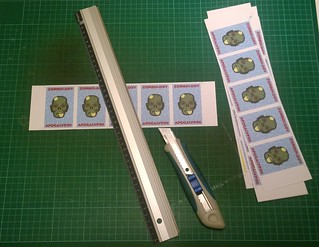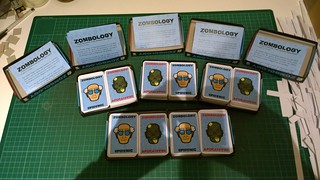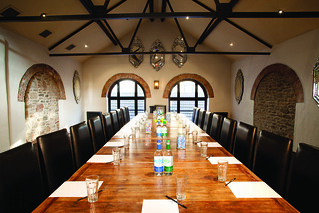A couple of weeks ago I talked about how I was forming a
Board of Advisers to help provide input on my plans and give me advice on how to be more successful. I sent the first report to them last week and got some really useful feedback, including a long email from
Brett Gilbert, designer of Divinare, Elysium and Professor Evil and the Citadel of Time. I've know Brett since my Reiver Games days when he submitted one of my favourite prototypes to me. He lived fairly locally, so we met a few times to discuss it, but sadly it went no further. In the meantime, Brett has co-founded the Cambridge Playtest UK group, been recommended for a Spiel des Jahres for Divinare and nominated for a Kennerspiel des Jahres for Elysium. So he struck me as a perfect candidate for the Board, and I was delighted when he accepted. His response to that first report was great, it really made me think about why I'm doing this. I've reprinted (with his permission!) an excerpt from his email below, along with my response - since I figure you guys might be interested too!
Perhaps the biggest question that this report doesn’t answer is what your long term goals are. You have a clear focus on hand-crafted games (and that’s a noble aim!), but you also raise the threat that a crowded internet space, in which other creators are drowned out by the noise of big Kickstarter campaigns, puts on your ambitions. KS is here to stay, and it has completely changed the landscape.
The best thing about the internet, as someone once observed, is that it makes everyone a publisher; and the worst thing about the internet is... that it makes everyone a publisher.
So. I'm just going to put something out there, just to see how it sounds…
Why are you laboriously hand-crafting games if your finished product is designed to look just like something that’s mass-produced? Zombology seems to be a POD product, just with *way* more leg-work for you. There are few exemplars of artisanal game-makers; indeed the only one I can think of is Gavin Birnbaum (Cubiko, Jam Sumo) — but he literally hews his games from lumps of wood, crafting objects with the spirit of a piece of art. That’s his thing, and he does it really well (and Jam Sumo is an absolutely cracking game), but every single one of his ‘pieces’ are unique and literally unattainable by other means — and buyers know that; they *feel* it. It takes him all winter to make 30 games. Their preciousness is *why* they are sought after — but also the thing that limits his success. Do you expect — *can* you expect — your buyers to have the same reaction to a box of Zombology?
This may feel like too harsh or too profound a judgement, but if you want to become an artisan rather than just a designer or a publisher, then the soul (for want of a better word) of your product has to be the thing that sells it. But if your goal is to make games — rather than crafted objects that are *also* games — then it seems as though hand-crafting your games will only slow your ambitions down.
I appreciate that this may not be the sort of feedback you were hoping for. But I hope there is something here to inspire you!
Best,
Brett
Hiya Brett,
You’ve raised a couple of great questions and ideas there, ones that deserve a reasoned response.
I’m a maker of things. At times it’s been (bits of) computer games, game designs, painted miniatures, mini scenery, hand-crafted games, mobile apps and hand-crafted games again. I’m much happier making something that I can be proud of than reading a book or watching TV or a movie. In the words of Race for the Galaxy I would rather Produce than Consume.
I enjoy designing games, I enjoy playtesting them. I love doing the graphic design (though I’m not great at it) and will give doing the art a go too (I’m pretty bad at this though, see Border Reivers and Zombology). I also love physically making games. Yes, it’s hard work and yes it’s time consuming, but I enjoy doing it, and doing it well so that I can look at the final product and be proud of the quality I’ve achieved.
You describe three different routes: the standard publisher/Kickstarter, my halfway house with hand-crafted games that aim for almost professional quality and hand-crafting works of art like Cubiko. Why have I chosen the route I have, and where am I aiming to take this? I’ll answer the first one first!
I’ve got previous self-publishing games. One of the things I learnt during my Reiver Games days is that I’m a pretty bad judge of what makes a popular game, more so if it’s one I’ve designed myself and I don’t have the distance to be able to judge objectively.
To Kickstart a game successfully you need great art (which I can’t do, so I’d have to pay for) and to be a great marketer (which I’m definitely not). I could easily throw a few grand at trying to Kickstart Zombology and fail due to my own shortcomings as a marketer, regardless of the quality of the game. I’m also uncomfortable with the ‘money up front before the product exists’ model of Kickstarter. The effort required to fulfill a Kickstarter quanity of orders and then try hawking the remaining stock to distributors and shops is also more time than I’m prepared to invest around a young family and a busy job with a reasonable amount of work travel.

The route I’ve chosen is also quite a lot of work, but I know exactly how much (it’s going to take 150 hours to make the print run) and it’s something I’m good at and enjoy. Sure, the fact that I’m only making a few games a week is slowing me down, I could sell the games faster if they were in boxes filling my garage (like the good old days!). But this is a halfway house and I’m reasonably confident I can sell 200 games (I’ve sold 300 hand-made games in a year before, though admittedly before Kickstarter).
The true artist’s route would require a different type of game, maybe I’ll design one of those in the future, but the only way I could do that with Zombology is to hand-paint the cards and I don’t have the skills for that.
To answer your second question (what are my long term goals), I want to continue sharing my games with gamers and hopefully bringing some fun to their lives through my games. I've invested £1,000 in the company. That's a chunk of money: not so much that I'd cripple myself if I lost it all but nor is it enough to do much in the games business. I've a plan I think I can deliver in 2017/18 to turn that into a slightly larger pot of money. If Zombology does well, I'll have more money to invest in my next game and so on. The hand-made print run is small enough that I believe I can sell it all, but large enough that the economies of scale mean I can do it at a reasonable price and still make a profit. Over time maybe I can build up enough reputation, brand awareness, customer loyalty and cash on hand that I can do a larger, professional print run, but unlike last time I do not want to rush it and end up losing money. If Zombology is hugely popular then I'm happy for someone else to publish it via Kickstarter or whatever, but that's not what I'm good at or nor what I want to spend my evenings doing.
I've got a day job that pays a decent salary and a family that I have a responsibility to help support. I'm not looking to quit my day job and start a publishing company again. Last time I invested a huge chunk of my life insurance payout and lived off another chunk for a couple of years. I didn't earn a salary for two years and managed to recoup only a third of what I'd invested in the company. Two years without any earnings, pension contributions, etc. I'll not be doing that again. I want to create a company that lets me fund my games design hobby, slowing growing over time while allowing me to share my designs with gamers so that those games can live outside of my games room and hopefully bring some fun to gamers I don't know and will likely never meet.







